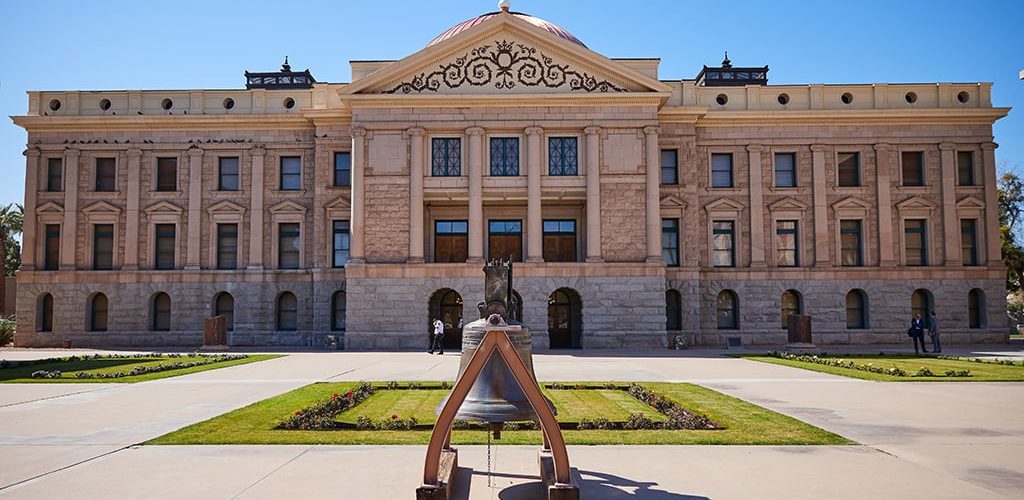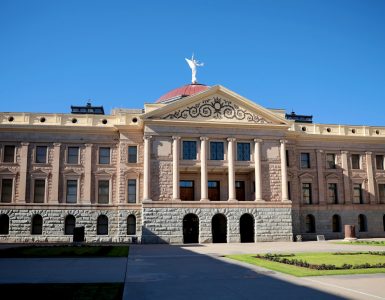The head of Arizona’s leading business advocacy group said Wednesday that he was pleased the governor and legislative leaders avoided an impasse that could have led to a government shutdown, but that he is concerned about the number of parochial projects in the nearly $18 billion state budget being debated by the state Legislature this week.
“The good of it, and there’s not much I think, is it shows that you can have a split government, with Governor (Katie) Hobbs, President (Warren) Petersen and Speaker (Ben) Toma coming together, to actually pass a budget and keep our government open,” Arizona Chamber of Commerce & Industry President and CEO Danny Seiden said in an interview with KTAR host Mike Broomhead on Wednesday. “The bad of it is the way in which that process developed was that each member was basically allotted a chunk of cash, so we have a state budget that is so loaded with pork barrel earmarking that it reads like a city council budget.”
The budget passed the House and Senate Appropriations committees yesterday. The Senate passed budget bills in an overnight session that ended early Wednesday morning. Despite protests from Democrats that the budget did not address their priorities, the bills all passed with some Democratic votes. The House is debating the budget today and is planning to take recorded votes on it following debate.
Seiden said the state budget should address matters that affect the entire state, not projects that are best left to local jurisdictions.
“The concern I have thinking about statewide business interests in the future is it’s not a very forward-looking budget or looking to address a lot of matters of statewide concern. What you have is people spending a lot of money on projects benefiting their area that doesn’t benefit the whole state, but the state shoulders that burden,” Seiden said.
Seiden cited the dangers of underfunding state university priorities and reallocating funds previously devoted to aiding K-12 public schools that are achieving better academic outcomes, especially in rural areas and urban areas that are typically underserved.
Seiden said he’s concerned that without proper funding, the state’s higher education institutions won’t be able to produce the number of graduates necessary to meet the demands of Arizona’s growing economy.
“You want to talk about what’s been a useful tool in economic development? It’s us funding the engineering programs at these universities, so I’m very concerned to see that cut.”
The $68 million that was previously pegged to the K-12 results-based funding formula was reallocated to K-12 baseline funding.
Seiden said he’s also worried about the implementation of the Legislature and previous administration’s plan to fund solutions to solving Arizona’s water crisis.
“Just looking at how the priorities are unfolding when we’re running a two-billion-dollar surplus, just gives me some pause moving forward,” he said.
Despite its concerns with some aspects of the budget, the Chamber acknowledged that the bipartisan agreement is only possible because of the strong economic foundation on which this year’s negotiations began.
The budget maintains the competitive tax environment that has been implemented over previous years, including the country’s lowest individual income tax rate among states with an income tax. The budget also continues to phase down the commercial property assessment ratio, a policy that was adopted last year with strong Chamber backing.
While some transportation projects were local in scope, major freight corridors that affect the entire state’s prosperity like Interstate 17 and Interstate 10 between Casa Grande and Chandler will see funding for significant upgrades.
In the workforce and college readiness space, the budget calls for funding to boost the number of students who can take college-level courses while still in high school, a program strongly supported by the business community.
Seiden says the business community’s role in future year budget negotiations is critical.
“We have to get louder, and more protective,” Seiden said. “If you like the growth, if you like the economy, let’s not mess this up now. Let’s not fumble as we go towards the endzone on the great momentum that has been built.”
















Add comment